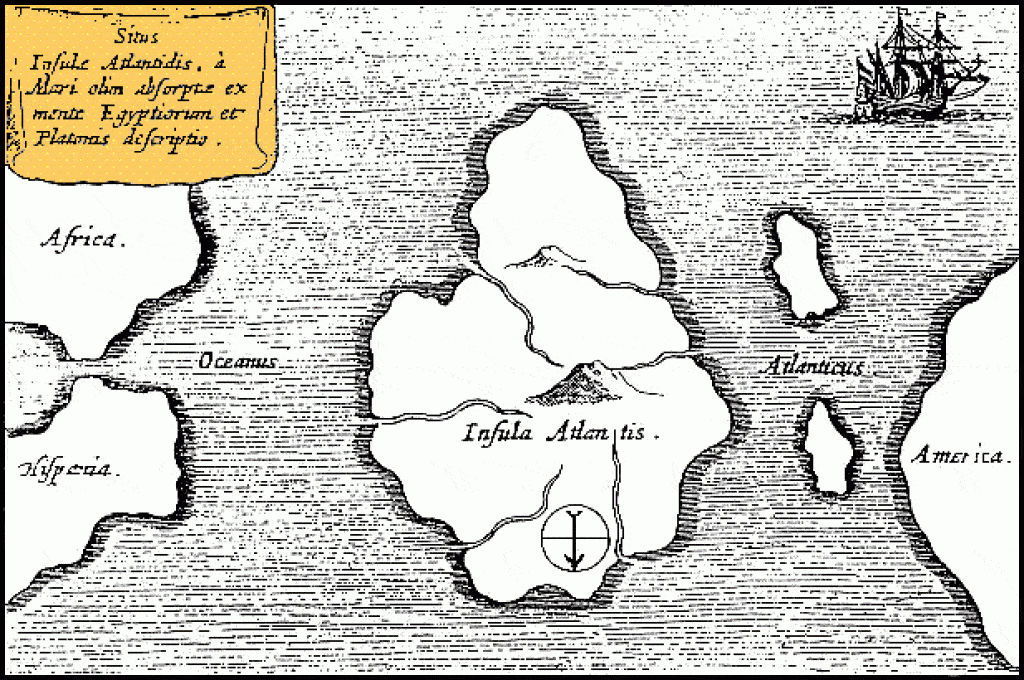Atlantis was an island that the Ancient Greek philosopher Plato wrote about in his Critias and his Timaeus. Plato told of a people, inhabiting the island, who were extremely advanced technologically and intellectually, but had declined morally to such an extent that they angered the gods. As punishment for their moral decline, the gods destroyed them and their island in a single day and a single night.

Plato claimed that this story was passed on to him by the Egyptians and that it was true. However, the location of Atlantis, and whether or not it ever existed, remains a mystery. Just like any other mystery, many people wish to solve it. Therefore, many researchers, scientists, and mystery enthusiasts have sought Atlantis for centuries. Some have concluded that the island of Santorini is a very likely location for the lost island of Atlantis. Truth be told, there are many similarities between Santorini and Plato’s description of Atlantis. However, there are many differences as well.
Atlantis was described as a circular island, possibly larger than Libya and Asia. It also had a concentric circle pattern with a canal leading from the inland to the sea. The island of Santorini is a crescent-shaped island in the Aegean Sea. It has been the site of a lot of volcanic activity over thousands of years. Therefore, its shape has changed dramatically since the estimated time of the supposed destruction of Atlantis. It was devastated by a large eruption during the Bronze Age. It is thought that the shape of Santorini would have been very similar to that of Atlantis before this massive Minoan eruption.
Related: Edgar Cayce on Atlantis
The description of the destruction of Atlantis does sound an awful lot like a natural disaster and, of course, the ancient people that may have witnessed it would have believed it to be the wrath of the gods, as in the Atlantis legend. Therefore, some people believe that the Minoan eruption of Santorini and the destruction of Atlantis are the same event. Are Santorini and Atlantis one and the same?
Plato described the people of Atlantis as an advanced civilization. The island presumably had many community buildings and homes on it. Obviously, any location that could possibly be considered as the potential location of Atlantis would have had to have been home to a civilized community. There is evidence of a Minoan civilization that existed on the island of Santorini prior to the Minoan eruption.
Regardless of all of these similarities between the island of Santorini and the lost island of Atlantis, many people are skeptical. While it may seem likely that the two are the same, there are still many differences between the two and there are educated assumptions that have been made in the comparison. For example, the dates of the eruption of Santorini and the date, given by Plato, of the destruction of Atlantis do not match up. Now, this could be explained by a mistranslation or a mistake on Plato’s part. This is coupled with the fact that the date that Plato gives is highly unlikely. Therefore, many people dismiss his date as incorrect. One must also remember that Plato’s telling of the story is, in fact, a retelling and therefore may not be completely accurate.
There is also the location of Santorini to consider. Plato puts the location of Atlantis “beyond the Pillars of Hercules.” The Pillars of Hercules are thought to mean the Straits of Gibraltar. If that is the case, then Santorini is nowhere near where Atlantis would have been. There are some theories that Plato may have had an agenda when he told the story, so he may have wanted to place Atlantis as far away from Greece as possible. Of course, that is purely conjecture and can never be known for certain.
Another thing to consider is the sheer size of the Atlantis described by Plato. Santorini is certainly not the size of Libya and Asia combined. Anything of that size would likely have been located in the Atlantic Ocean, which would also be “beyond the Pillars of Hercules,” if they are, indeed, the Straits of Gibraltar.
One last thing to consider is the difference between Santorini’s Minoan civilization and the civilization that supposedly existed on Atlantis. The Atlantians were supposedly destroyed, along with their home. Interestingly, not one body has been discovered at the Minoan site. This would suggest that the residents of the island had enough warning of the impending to disaster to vacate the island before it struck. This most definitely does not match up with the fate of the Atlantians.
Related: What Happened to the Minoans? New Clues May Give Us An Answer
There is, of course, the possibility that Plato or the Egyptians simply concocted the story of Atlantis to teach a lesson in morality. In that case, Atlantis will never be discovered, on Santorini or anywhere else. Nonetheless, the fact that the existence of Atlantis cannot be disproved will keep men searching for it. Whether for the purposes of filling the pages of history or for the purposes of finding the riches that presumably sunk with the island, the search for Atlantis is a thrilling one that will not likely be given up any time soon.